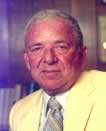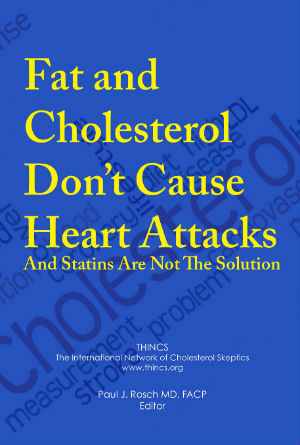Fat and Cholesterol Don't Cause Heart Attacks 1 of 3

By Paul J. Rosch, M.D., M.A., F.A.C.P.
The following is excerpted from the book:
Fat and Cholesterol Don't Cause Heart Attacks And Statins Are Not The Solution
What Causes Heart Attacks?
If you ask anyone "What causes heart attacks", the vast majority, including physicians, would undoubtedly blame high cholesterol from eating too much fat, or include this along with unavoidable influences like heredity and stress.
That's not surprising, since this dietary fat ® elevated cholesterol ® heart attacks scenario has been repeated over and over so many times for the past 70 years, that it has become accepted as gospel. As William James, the father of American psychology noted. "There's nothing so absurd that if you repeat it often enough, people will believe it."
But there was nothing absurd about this. It was easy to visualize how fatty foods could elevate blood cholesterol, which was then deposited in arteries where they reduced and ultimately blocked the flow of blood.
Animal studies seemed to support this sequence of events and large scale epidemiologic studies in different countries purportedly showed a close correlation between fat consumption and deaths from heart disease, and in some instances, with cholesterol levels.
Proponents of this "Diet-Heart" or lipid hypothesis included eminent researchers and physicians who received the Nobel Prize, Lasker and other Awards for their contributions to this theory.
As a result, reducing fat intake, especially saturated fat, has been U.S. policy for the past 35 years. These official guidelines are the basis for determining the foods that will be used in the military, government cafeterias, schools, food assistance programs, industry food formulations, and restaurant recipes, as well as recommendations made by nutritionists and dieticians. And since they were also endorsed by leading authorities and prestigious organizations such as the American Heart Association and the American College of Cardiology, it was assumed that restricting fats would provide cardioprotective and other health benefits.
The advent of statins, which allegedly prevented heart disease by lowering cholesterol, appeared to prove the validity of the lipid hypothesis, and statins quickly became the best selling prescription drugs ever.
How Could We Have Been So Wrong For So Long?
The above erroneous beliefs began 100 years ago based on studies showing that feeding rabbits purified cholesterol obtained from egg yolks for two or three months produced lipid laden lesions rich in cholesterol in the aorta and other arteries.
However, since rabbits are herbivorous, cholesterol is a foreign substance and blood levels were 4-5 times higher than those seen in humans. More importantly, these results could not be replicated in rodents or carnivorous animals so they were not relevant to humans. In addition, there was little clinical interest in any of the above, since prior to 1920, less than 10% of all U.S. deaths were due to heart disease.
That changed dramatically in the 1950s, when this had escalated to over 30% as an epidemic of heart attacks in middle-aged men was sweeping the U.S. This was also attributed to increased intake of fatty foods by Ancel Keys, after whom the K-rations used by US troops in World War II had been named.
He demonstrated an almost straight line relationship between death rates from coronary disease to fatty food consumption in six countries, with Japan having the least and US the most This was confirmed in his subsequent much larger Seven Countries study that showed heart attack and stroke death rates were also directly related to serum cholesterol levels and that saturated fats were the main culprit.
The problem was that although Keys had data on 22 countries, he cherry picked the seven that best supported his theory. When all the countries were included, there was no fatty diet-heart disease link, and had he selected Israel, Sweden, Germany and France, he would have concluded that the more saturated fat consumed, the lower the incidence of coronary heart disease..
Nevertheless, Keys was featured on the cover of the January 13, 1961 issue of Time magazine, was referred to in the media as "Mr. Cholesterol", and one leading authority triumphantly proclaimed, "No other variable in the mode of life beside the fat calories in the diet is known which shows such a constant relationship to the mortality rate from coronary or degenerative heart disease".
The tremendous publicity given to his conclusions stimulated numerous attempts to reduce coronary disease by low fat diets. The Anti-Coronary Club Project launched in 1957 compared two groups of middle-aged New York businessmen.
One group followed a "Prudent Diet" with corn oil and margarine instead of butter, cold cereal rather than eggs, and chicken and fish instead of beef. A control group ate eggs for breakfast and meat three times per day.
The results published a decade later revealed that cholesterol levels of those on the Prudent Diet were slightly lower than the control group eating eggs and meat but there were eight deaths from heart disease compared to none in the high fat control group.
In a final effort to prove his point, Keys fed middle-aged men a very high cholesterol diet but found that their blood cholesterol was no different than a control group who consumed less than half as much.
Twenty years later, he was forced to admit, "There’s no connection whatsoever between cholesterol in food and cholesterol in blood. And we’ve known that all along. Cholesterol in the diet doesn’t matter at all unless you happen to be a chicken or a rabbit."
Paul J. Rosch, M.D., M.A., F.A.C.P.







